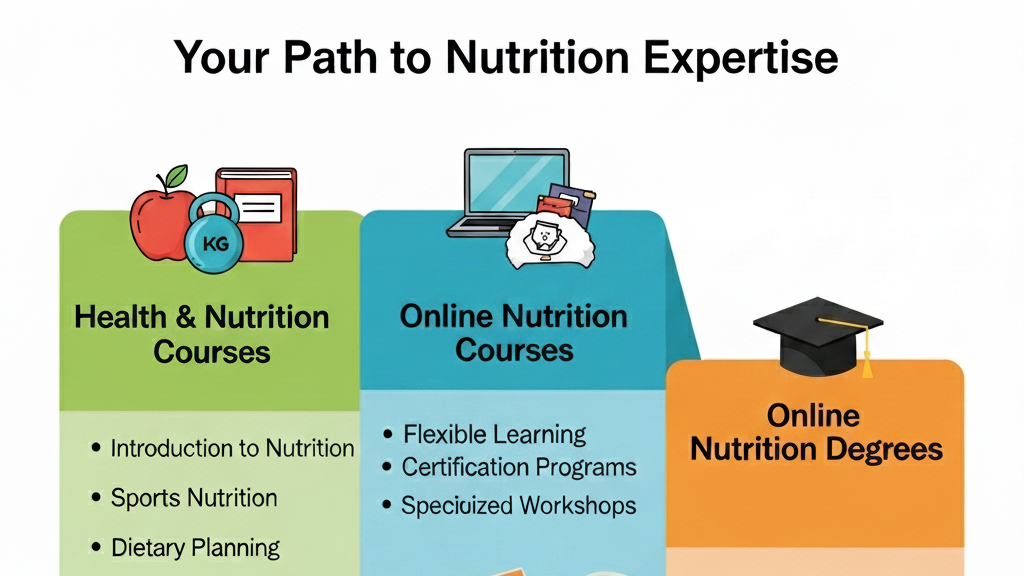Thinking of a Career in Health and Nutrition? Begin Here If you are enthusiastic about food, health, and assisting people to make healthier lifestyles, studying a course in nutrition and dietetics may be a good decision for you. Such courses are not merely studying diets — they combine science, practical application, and human health to produce educated professionals who can literally make an impact. In this guide, we'll discuss what a course in nutrition and dietetics entails, what you can expect, career prospects, and how to select the right program. Whether you're beginning or progressing from your existing qualification, knowing your options is essential to making the proper decision. What Is a Nutrition and Dietetics Course? A dietetics and nutrition course is an organized program of study that aims to educate students on how food and nutrition affect human health. The course involves theoretical knowledge integrated with practical applications to equip students for professional careers in clinical, community health, wellness coaching, foodservice management, research, and other areas. Students may learn the following subjects depending on the program: Human anatomy and physiology Biochemistry and food science Nutritional assessment Medical nutrition therapy Public health nutrition Diet planning for specific populations (e.g., children, elderly, sports persons) Food safety and hygiene Courses can vary from short-term certificate to full-time undergraduate or postgraduate programs. Why Study Health and Nutrition Courses? There has been a tremendous increase in the requirement of skilled professionals in the field of health and well-being. With increased consciousness regarding the function of diet in controlling chronic ailments such as diabetes, cardiovascular conditions, and obesity, health and nutrition courses are more than ever. Some of the principal reasons why you should look at a career in this profession are: Good employability: Dietitians and nutritionists are in demand in hospitals, private clinics, gyms, schools, food industry, and public health departments. Diverse career options: You can decide to work in clinical practice, research, education, corporate wellness, or even establish your own consulting practice. Real-world impact: You’ll help individuals and communities make informed decisions about their health, potentially improving their quality of life. Types of Nutrition and Dietetics Courses 1. Certificate and Diploma Courses Ideal for beginners or working professionals who want to upskill. These are short-term courses (3 months to 1 year) focused on specific areas like: Weight management Sports nutrition Clinical nutrition Child and maternal nutrition 2. Undergraduate Programs (B.Sc. in Nutrition and Dietetics) A 3-4 year course that focuses on basic and advanced subjects. Graduates can become nutrition consultants, dietitians (if licensed), food analysts, or wellness advisors. 3. Postgraduate Degrees (M.Sc., PG Diploma) For students who want to specialize further or do research. These courses usually have internships, lab practice, and case studies. 4. Online and Distance Learning Options Online health and nutrition courses are increasingly popular due to their flexibility. Many accredited institutions now offer high-quality online learning with recorded lectures, reading materials, and live Q&A sessions. What to Look for in a Good Nutrition and Dietetics Course Choosing the right course is critical to your long-term success. Here are some essential factors to consider: Accreditation and Recognition Make sure the course is taught by a reputable university, college, or professional association. Accredited courses are up to industry and academic standards, which is particularly valuable if you wish to become a registered dietitian or nutritionist. Practical Training Nutrition and dietetics are practical disciplines. Seek programs that provide: Hospital or clinic internships Case studies based in real life Food and biochemical lab sessions Qualified Faculty Quality of education relies significantly on the faculty. Clinical, academic, and research experience faculty members bring credibility and hands-on knowledge to your education. Course Structure and Specialization Certain courses enable you to specialize in topics such as pediatric nutrition, community health, or sports nutrition. Ensure that the syllabus reflects your interests and professional goals. Job Placement Support Institutions that offer career guidance, resume writing clinics, and employment assistance can assist you in entering the job market more easily. Career Prospects Following a Course in Nutrition and Dietetics Obtaining a degree from an approved course opens up many possibilities. Some of the typical career options are as follows: Clinical Dietitian – Work in hospitals to develop diet plans for patients. Public Health Nutritionist – Encourage healthy nutrition at a community level. Sports Nutritionist – Optimize an athlete's performance via diet. Food Safety Officer – Maintain hygiene and safety in food production facilities. Corporate Wellness Coach – Create wellness programs for businesses and workers. Research Analyst – Study diet and disease for educational or corporate use. Entrepreneur – Open your own practice or line of health products. Frequently Asked Questions Is a license necessary to be a dietitian? Yes, in most nations, including India, the UK, and the US, a registered dietitian (RD) needs to be licensed or certified by a respected authority. Ensure your selected course readies you for this. Are online courses in health and nutrition accepted? Most are. Just ensure they are accredited and involve tests or assignments. Some companies will favor classroom instruction, yet for some jobs, online certifications are approved. Can I begin my own practice once I've finished the course? Yes, lots of professionals have private consultations or offer services online. Legal restrictions do depend on where you are, though, so look at local law. Final Thoughts Pursuing a nutrition and dietetics program is more than merely an academic choice — it's a commitment to a rich career. As the focus on wellness and preventive care increases globally, talented nutritionists are needed everywhere. Before deciding on a course, make a serious effort to research. Invest in accredited programs that provide practical experience, industrial linkages, and specialization opportunities consistent with your aspirations. Whether you plan to work in a hospital, corporate environment, or become an entrepreneur, effective health and nutrition courses can guide you toward success.







